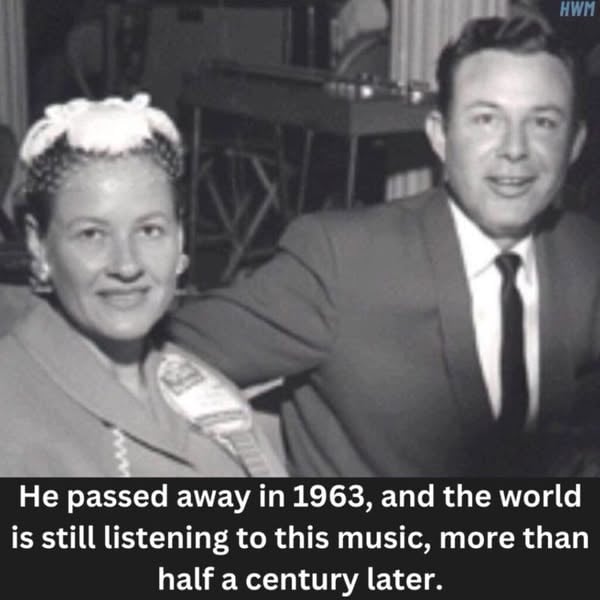In 1960, the music scene received a rare and remarkable gift—a song that would not only skyrocket the career of its singer but also change the landscape of country and pop music forever. That song was “He’ll Have to Go,” performed by the smooth, velvety-voiced Jim Reeves. It was a track that captured the imagination of millions and redefined what a country ballad could be, blending sophistication with the raw, heartfelt emotion that country music is renowned for. The impact of this song was immediate and profound, transforming Reeves from a regional artist into a global legend practically overnight.
Jim Reeves, often affectionately called “Gentleman Jim,” was a performer who effortlessly bridged two worlds—those of polished, urban country and the genuine, soulful storytelling that defines the genre’s roots. Hailing from Texas, Reeves began his career not just as a singer, but also as a radio announcer. His early days behind the microphone helped him develop a warm, resonant voice that could convey a universe of emotions in a single note. From those humble beginnings, he rose through the ranks, honing his craft and building a dedicated following. But “He’ll Have to Go” was the song that elevated him beyond recognition; it marked his entry into a new league, one that combined elegance with heartfelt authenticity.
The story behind “He’ll Have to Go” is as compelling as the song itself. The song was penned by Joe and Audrey Allison, and its origins are rooted in a spontaneous moment of raw vulnerability. According to reports, Joe Allison was in a bar, overhearing a man desperately pleading with his lover over the phone. The man’s words, “Put your sweet lips a little closer to the phone,” expressed an aching longing—a desire to reconnect, to hear what he was missing, and to hold onto a fragile thread of love amid the chaos of life. That simple phrase resonated deeply, capturing the essence of yearning and heartbreak, and became the core around which the song was built.
When Reeves entered the recording studio to bring “He’ll Have to Go” to life, he didn’t merely sing the lyrics—I believe he lived them. His voice was so rich and expressive that listeners felt as though they were eavesdropping on a private, intimate moment. Producer Chet Atkins, renowned for his musical wisdom and innovative approach, kept the backing track understated, emphasizing Reeves’s voice above all else. The result was a stripped-down, raw recording that engaged listeners on an emotional level—an intimate, almost confessional ballad that made people feel understood in their deepest longing.
The power of the song lies in its simplicity and sincerity. There are no grand orchestras or elaborate arrangements to distract from the heartfelt message. Instead, Reeves’s voice, with its gentle, soothing tone, becomes the focal point—an unfiltered channel of emotion that pulled listeners into a world of longing, regret, and hope. His delivery was so genuine that “He’ll Have to Go” transcended genre boundaries—becoming a crossover hit that appealed to both country and pop audiences alike. It was a song that didn’t just sound beautiful; it sounded real, connecting on a visceral level with anyone who had experienced love, loss, or the ache of separation.
The success of “He’ll Have to Go” was swift and enduring. It catapulted Reeves into international stardom, solidifying his reputation as one of the most influential voices of his generation. His velvet voice, combined with his elegant style and heartfelt delivery, made him a symbol of a timeless era—an artist who could evoke the deepest emotions with grace and sincerity. The song became a signature piece that defined his career and cemented his place in the annals of musical history.
What makes “He’ll Have to Go” so remarkable isn’t just its commercial success, but its cultural significance. It shifted the perception of country music, elevating it from simple storytelling to an art form capable of profound emotional expression. Reeves’s recording demonstrated that with the right touch, country music could be both refined and deeply moving—a combination that would influence countless artists for generations to come.
Looking back, it’s clear that Reeves’s version of the song was a masterclass in authenticity. His ability to embody the song’s emotional depth turned a simple lyrical idea into a universal statement about love and longing. Through “He’ll Have to Go,” Reeves didn’t just create a hit song; he crafted a timeless piece of musical poetry that continues to resonate with audiences everywhere. His influence endures, inspiring new generations to explore the emotional power of their own voices and remind us all of the beauty that lies in vulnerability.
In the end, “He’ll Have to Go” remains not just a song, but a testament to the timeless art of storytelling through music. It’s a reminder that sometimes, the simplest expressions—words of longing, a gentle voice—are the most profound. And Jim Reeves, with his velvet tone and earnest delivery, proved that authenticity and emotional sincerity are what truly make a song—and a man—


